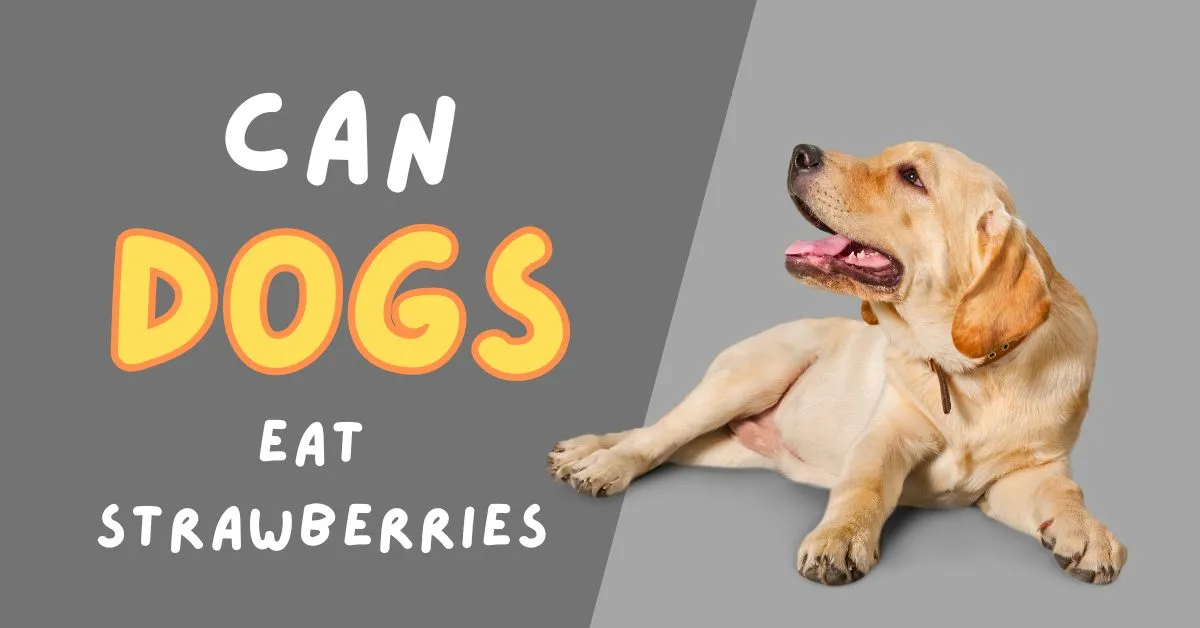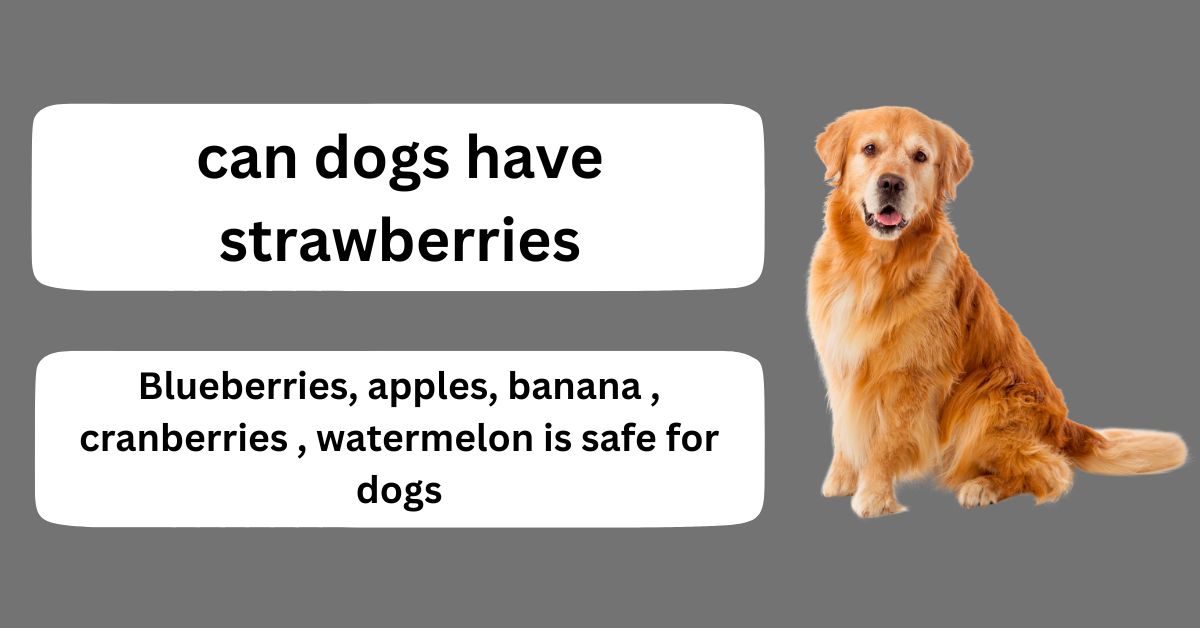It’s normal to see your dog enjoying something you are also fond of, giving him your favourite human snack rather than a dog treat for example; can dogs eat strawberries which you love. Ultimately, your dog should be able to consume it if it is safe for you to eat, right? Not always. Finding out which people foods i-e fruits and vegetables are suitable for dogs to consume is essential, although some items are safe for both of you while others can have detrimental effects on their health.
Dogs’ digestive systems differ from those of humans, thus feeding them the wrong things acceptable for humans, can cause long-term health issues and, in severe situations, can lead to death. Dogs are omnivores, so adding fruits and veggies to their diet isn’t really necessary, but it’s acceptable to give them as treats or snacks if they are healthy to consume.
Fresh dog food already contains fruits and vegetables which acts as a source of vitamins, minerals, and antioxidants, fulfilling their nutritional requirements.. Continue enlightening yourself to learn which fruits and vegetables should be avoided and which can be shared in moderation, and which are not in the best interest of your dog’s health.
Fruits Safe for your Dog
Apples:
Can dogs have strawberries, blueberries and apples? Fruit of same family. Yes, dogs can eat apples. For your dog, apples are a great source of fiber, vitamins A and C, and both. They are the ideal snack for older dogs because they are low in fat and protein. Just make sure the seeds and core are taken out first. For a cool snack in the warm weather, try them frozen. It’s also a component in apple-flavoured dog treats.
Avocado:
No, avocados are not good for dogs. Although dog owners may find avocados to be a nutritious snack, dogs shouldn’t be fed avocados. Persin is a toxin found in avocado pits, skins, and leaves that frequently leads to gastrointestinal upset like diarrhoea.
Dogs may find the avocado fruit’s fleshy interior to be excessive even if it contains less persin than the plant’s other parts. Avocado flesh also contains a lot of fat, which can upset a dog’s stomach resulting in range of issues from osmotic diarrhoea to the deadly condition like pancreatitis in high dose.Your dog can still benefit from avocado’s health benefits from the avocado based dog treats for the skin and the coat.
Bananas:
Dogs can indeed consume bananas. When given in moderation, bananas make an excellent low-calorie dog treat. They are enriched with potassium, fiber, copper, vitamins, and biotin. Bananas are low in salt and cholesterol, but because of their high sugar content, they should only be given as a treat rather than as part of your dog’s regular diet. (Dog snacks made of bananas that never go bad are also available!)
Blueberries :
Dogs may devour blueberries, yes. Antioxidants included in blueberries, a superfood, protect cells against deterioration in both humans and canines. They are also a great source of phytochemicals and fiber. Is your dog learning how to grab treats in the air? Try some blueberries! Blueberries and strawberries are sometimes combined with other superfoods like yogurt, a common element and healthy in blueberry dog treats.
Cantaloupe :
Dogs are permitted to eat cantaloupe. Cantaloupe is a fantastic source of fiber and water, plus high in minerals and low in calories. But because it contains a lot of sugar, it should only be given in moderation—especially to diabetic and overweight dogs. For a cool summer enrichment treat for your dog, try freezing cantaloupe balls or cubes, along with strawberries and blueberries.
Cherries :
Dogs shouldn’t ingest cherries, sorry. Cherry contains cyanide, with the exception of the fleshy fruit surrounding the seed. Because cyanide interferes with cellular oxygen transport, the oxygen that reaches your dog’s blood cells is insufficient. If your yard has a cherry tree, make sure your dog cannot easily access the falling fruit.
If your dog consumes entire cherries or cherry pits, keep an eye out for symptoms such as red gums, dilated pupils, and breathing difficulties since these could indicate cyanide poisoning. When eating cherries yourself, make sure to store the pits in a dog-proof garbage can or trash bin that your dog cannot get. Additionally, teach your children not to share their cherries with dogs and safe handling of cherry pits.Select cherry dog treats that are specially made for your companion to safely let them enjoy the antioxidant benefits of cherries.
Cranberries :
It is safe for dogs to eat cranberries. Small amounts of fresh or dried cranberries can be safely given to dogs. Another consideration is if your dog will really enjoy this tart treat. In any case, like with any treat, moderation is key when giving cranberries to dogs, since an excess of them might cause upset stomach.
It’s also important to keep in mind that a lot of dried cranberries that are offered for human use are sweetened, so feeding them to your dog will add extra sugar to their diet. Instead, choose unsweetened fresh or frozen fruits, or grab some crunchy cranberry dog treats, if your dog is hankering after the tart flavour of cranberries.
Cucumbers :
Dogs can indeed consume cucumbers. Because they are high in satiating water and low in fat or carbohydrates, cucumbers are particularly beneficial for overweight dogs. They are rich in potassium, copper, magnesium, biotin, and the vitamins K, C, and B1. If your dog likes them, cool cucumbers make a great hot weather treat. You can even freeze pieces for an entertaining enrichment snack.
Grapes :
No, grapes should never be fed to dogs. Contact your veterinarian if you suspect that your dog has consumed grapes. Regardless of the breed, age, or sex of the dog, grapes and raisins (dried grapes) have been shown to be extremely hazardous to dogs. In fact, grapes can cause acute renal failure because of their severe toxicity.
Always be aware of this detrimental fruit when around dogs, particularly if you have children who likes to eat raisins or grapes at home. When discarding grapes or raisins, make sure your trash can is dog-proof or, for more cunning canines, out of reach of your dog. Also, avoid placing them in a compost pile where your dog can get to them.
Mango :
Dogs can consume mangos, yes. Four distinct vitamins are contained in this juicy and delicious tropical treat: A, B6, C, and E. In addition, mangoes contain beta- and alpha-carotene and potassium. Just keep in mind that, like with other fruits, you should cut out the hard pit first since it might choke you and contains trace levels of cyanide.
Because mangos are heavy in sugar, they should only be used as a reward occasionally, especially for dogs that have weight issues. Chewy mango dog treats are a less messy way to get the advantages of the superfood elements found in mangos.
Oranges :
Yes, dogs can consume oranges. Oranges are safe for dogs to consume, according to veterinarians, but canines are sometimes put off by strong citrus smells or tastes. Oranges are high in vitamin C, potassium, and fiber, and in little amounts, the juicy flesh can be a delightful treat for your dog.
Veterinarians advocate discarding the orange peel and only giving your dog the meat of the orange, without the seeds. Harsh aroma of orange peel can cause your dog to turn up their sensitive noses. If your dog doesn’t like fresh citrus, there are a few orange-flavored dog treats to select from.
Pears :
Certainly, peaches are healthy for dogs to ingest. Fresh or frozen peaches, when divided into small pieces, are an excellent source of vitamin A and fiber. However, the pit, similar to cherries, contains cyanide. Fresh peach flesh can be an excellent summer treat, provided that the flesh is entirely removed from the peach pit.
Ensure that the pits are disposed of in dog-safe garbage receptacles. Avoid tinned peaches, as they frequently contain substantial quantities of sugary syrups. Even canned or preserved peaches that are “in natural juice” contain an excessive amount of sugar, which is not suitable for older and diabetic dogs. Frozen peach slices can serve as an enjoyable enrichment snack for canines during hot weather.
Pears :
Certainly, canines are capable of consuming pears. Pears are an excellent refreshment due to their high fiber, copper, and vitamin C and K content. Be cautious when sharing pears with your dog; the seeds contain traces of cyanide. Cut the pear flesh into bite-sized pieces and remove the pit and seeds before serving. Refrain from consuming tinned or jarred pears that are infused with sugary syrups, regardless of whether they are labeled “in their own juice.” Additionally, there are pear dog treats that contain additional functional ingredients, such as duck or salmon.
Pineapple :
Certainly, pineapple is healthy for dogs to consume. A few pineapple chunks are an excellent sweet treat for canines, make sure to remove the prickly outer peel and crown, beforehand. Vitamins, minerals, and fiber containing tropical fruit is also enriched with bromelain, an enzyme that facilitates the absorption of proteins by canines.
As with other fruits, it is advisable to avoid canned or packaged pineapple in sweetened syrups for canines, as they do not require additional sugars in their diets, particularly if they are at risk of obesity and diabeties. Pineapple dog treats are also available for those who desire a sample of the islands while on the go.
Pumpkin :
Certainly, canines can benefit from consuming pure pumpkin. Pumpkin is abundant in antioxidants; however, its most remarkable attribute is its ability to alleviate both diarrhea and constipation in canines. When purchasing canned pumpkin, it is recommended that you select 100% pumpkin puree. Alternatively, you may roast the pumpkin in the oven and feed the peeled pumpkin flesh to your pup. Additionally, there are numerous pumpkin dog treats and supplements that canines can relish.
Raspberries :
Dogs possess the ability of consuming raspberries. Raspberries are harmless for dogs when consumed in moderation. They contain antioxidants that are beneficial for canines. They contain a high concentration of fiber, manganese, and vitamin C, despite being low in sugar and calories. The anti-inflammatory properties of raspberries make them particularly beneficial for senior canines, as they can alleviate the symptoms of aging joints and strengthen their immunity. Nevertheless, raspberries do contain small, naturally occurring quantities of xylitol. Therefore, it is necessary to restrict your dog to no more than eight ounces of fresh or frozen raspberries at a time. Or, you may opt for a raspberry containing dog delight.
Strawberries :
Can dogs eat strawberries? Yes, our lovely pets can enjoy the health benefits of strawberries. Strawberries are enriched with Vitamin C and fiber, alongside the enzyme strengthening and whitening their teeth. Just like other fruits, strawberries also contain a decent amount of sugar, so they should be consumed in moderation. Frozen strawberries are fun treats for your pet dogs. If your dog is fond of strawberries, you can add them in yogurt. Strawberry flavored dog treats can als be used to fulfill the satiety of your dog for strawberries.
Tomatoes :
Your companion can only have the ripened flesh of the tomatoes but be careful about the green plant, which contains solanin, a toxic chemical leading to gastrointestinal and central nervous adverse effects, resulting in diarrhea, vomiting, dizziness and confusion. But here is a catch, dogs need to eat a large amount of tomatoes to get sick, however it is wise to avoid tomatoes altogether. Moreover, make sure that the tomato plants in your garden are out of reach from your dogs. Your dog can enjoy tomato flavored snacks to have antioxidant benefits.
Watermelon :
Yes, dogs can enjoy the delicious and watery watermelon, but do not forget to remove hard rind and seeds first hand, as they can lead to intestinal irritation and blockage, resulting in a hefty visit to your vet. Watermelon is full of vitamins, minerals and especially water, making it an excellent choice to maintain the hydration of your friend in summers. Frozen watermelon is a fun hot-weather treat for your dog.
Vegetables Safe for Your Dogs
Asparagus
Dogs shouldn’t be eating asparagus. Although asparagus is not inherently harmful to dogs, there is no significant benefit to feeding it to them. It is too tough to consume raw, and the nutritional value of asparagus is significantly diminished by the time it is cooked to a soft consistency suitable for your canines. If you are truly interested in sharing a vegetable with your dog, there are numerous other alternatives that would be a superior choice. However, it is not harmful to your dog if they have a particular fondness for asparagus.
Broccoli :
Certainly, broccoli is safe for canines to consume in moderation and is most effective when served as an occasional treat. It is minimal in fat and high in fiber and vitamin C. Nevertheless, broccoli florets contain isothiocyanates, which have the potential to cause mild to severe gastric irritation in certain canines.
Dogs have been known to experience obstruction in their esophagus as a result of the toughness of asparagus stalks. Therefore, it is preferable to provide your dog with cooked broccoli in order to prevent these complications. (Alternatively, you may allow them to suckle on a dog chew toy shaped like broccoli while you consume your beef and broccoli takeout.)
Brussels Sprouts :
Yes, Brussels sprouts are edible for canines. Brussels sprouts are an excellent source of antioxidants and nutrients that are beneficial for both humans and canines. Don’t overfeed them to your dog, however, as they can result in an abundance of flatulence. Cabbage is also safe for canines, as Brussels sprouts are essentially miniature cabbages.
However, sharing cabbage with your dog raises the same flatulence flag. Please refrain from claiming that we failed to advise you. Some dehydrated dog foods that incorporate these leafy greens as a component may be worth considering if your dog is a huge fan of Brussels sprouts or cabbage and you are satisfied with the outcomes.
Carrots:
It is true that canines are capable of consuming carrots. Beta-carotene, which is responsible for the production of vitamin A, is abundant in carrots, making them an exceptional low-calorie nibble. Additionally, your dog’s teeth will benefit from the act of chomping on this orange root vegetable. There is an abundance of carrot dog delights and numerous dog foods that contain carrots as main ingredients.
Celery :
Certainly, celery is healthy for dogs to consume. This crunchy green refreshment contains the nutrients necessary to promote a healthy heart and potentially combat cancer. Additionally, celery is recognized for its ability to alleviate the unpleasant odor of dogs. For a treat that any dog would relish, consider celery dog snacks.
Green beans :
Indeed, canines are capable of consuming green beans. Green beans are safe for canines to consume in any form, whether they are chopped, steamed, raw, or canned, as long as they are unseasoned. Green beans are abundant in essential vitamins and minerals, as well as low in calories and high in fiber. Alternatively, frozen green beans can be amusing enrichment snacks.
Mushrooms :
No, mushrooms should not be consumed by canines. It is possible for canines to get intoxicated due to wild mushrooms., especially the ones that are toxic for humans can cause significant harm to your dog or even result in mortality. Although wild mushrooms are always prohibited, washed mushrooms available in supermarkets for human consumption are generally safe for canines.
Onions :
Onions are not permissible for canines to consume. Most canines, including cats, are poisoned by the Allium family of plants, which includes onions, leeks, and chives. The consumption of onions by your dog can result in the rupture of red blood cells disturbing the oxygen transport, as well as nausea, vomiting, diarrhea, and gastrointestinal pain. Onion posioning is more severe in Japanese breeds such as Akitas and Shiba Inus. Ensure that children in your home are not sharing foods with your dog that contain onions. Additionally, secure any onion food scraps or residues in a location that your dog cannot access.
Peas :
Indeed, canines are capable of consuming peas. It is permissible for canines to occasionally discover green peas, snow peas, sugar snap peas, and garden or English peas in their bowl. Peas are abundant in protein and fiber, and they are also a source of numerous vitamins and minerals. Canned peas with added sodium should be avoided; however, fresh or frozen peas may be consumed by your dog.
Spinach :
Yes, canines are capable of devouring spinach; however, it is not among the most desirable vegetables to feed to your pet. Oxalic acid, which is abundant in spinach, can impede the body’s calcium absorption and result in kidney injury. Although it is unlikely that your dog would experience this issue until they consume an excessive quantity of spinach, it may be more advantageous to select an alternative vegetable. For an occasional nibble, spinach dog treats are available to provide your dog with the advantages of the leafy green vegetable.








